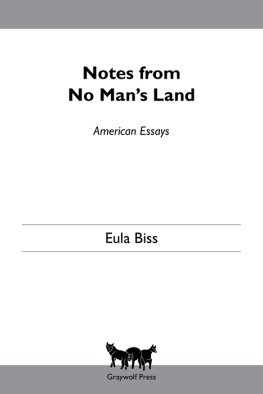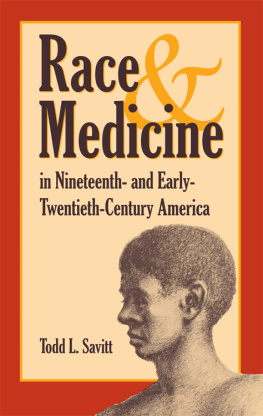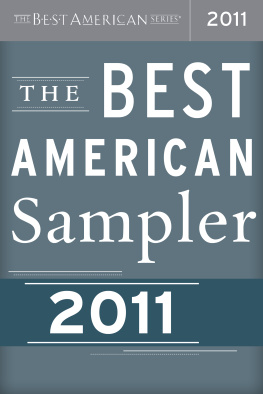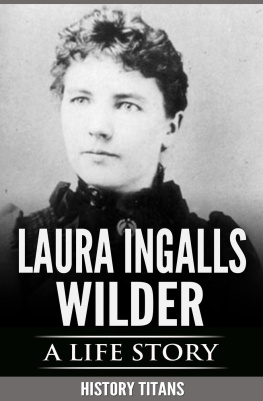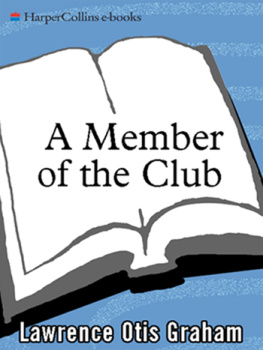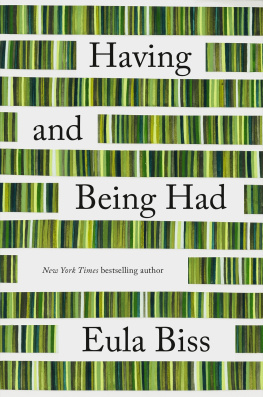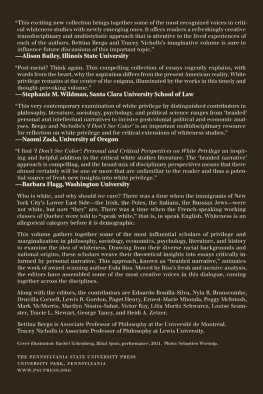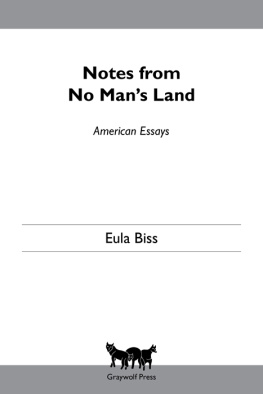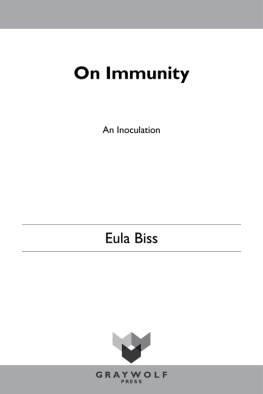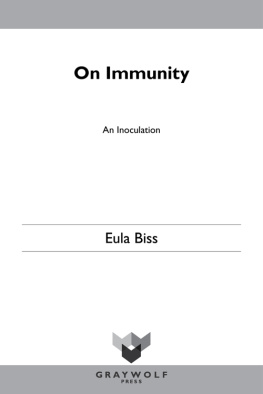PRAISE FOR
Notes from No Mans Land: American Essays
* Winner of the National Book Critics Circle Award for Criticism *
* Winner of the Graywolf Press Nonfiction Prize *
* A Time Out Chicago Best Book of the Year *
* A School Library Journal Best Adult Book for High School Students *
What do a gentrifying lakeside Chicago neighborhood, the invention of telephone poles, NAFTA, and race-based adoption have in common? In Eula Bisss book of essays, Notes from No Mans Land, its the formation of Americabut a vision of America antic, new and varied, and as far from a melting pot as Lake Michigan.... By approaching her subjects sideways, Biss avoids sounding dry or clumsily political. But she also makes an implicit pointthe story of our country is not straightforward, but one of unexpected siblings and strange adoptions, a story of change, adaptation, and surprising ancestry.... After reading Notes from No Mans Land, readers will have a hard time seeing America the same way, too.Lizzie Skurnick, from her citation for the National Book Critics Circle Award
Bisss examination of Americas complicated racial heritage offers penetrating insight. In Back to Buxton, she contrasts the supposedly progressive university in Iowa City, where white and black students rarely cross paths, with the early-20th-century hamlet of Buxton, a small, Jim Crowera town that functioned, briefly, as a desegregated utopia.... Is this Kansas?, in particular, raises some troubling questions about the way the young are trained to view tragedies like Katrinaoften through the harsh lens of racial stereotypes. Telephone poles may be on their way out, but at moments like these, Biss still encourages us to reach out and connect.Time Out New York
As Biss takes us on a tour through life in New York City; San Diego; La Salina, Mexico; and Iowa, the author is not afraid to sound foolish or to show uncertainty or weakness. She contemplates the pat-downs but never does anything about them. But such candidness isnt offered up to gain our sympathy. (In fact, its easy to forget that Notes from No Mans Land, cultural critique aside, is a memoir of sorts.) Instead, it is the human companion to a piercing insight that continually surprises, astonishing us with arguments we didnt even realize our author was making. Biss is telling us the story of our countryone we never saw coming.The Chicago Tribune
Whether pointing out the self-serving hypocrisy of modern institutional agendas or rewriting Joan Didions famous Goodbye to All That, Bisss steady gaze is invaluable to the contemporary essay.... Reading this book will force you to take a long, hard look at whats going on in a no mans land near you.Rain Taxi Review of Books
Expository writing should always be this compelling, provocative, and intelligent. Biss explores race in America through multiple lenses, examining common issues through uncommon situations and events. She flawlessly weaves present-day experiences with historical research to create 13 essays that combine narrative appeal with fascinating facts.School Library Journal
With surgical-grade prose and an earnest, unrelenting pursuit of uncomfortable truths, Biss explores what it means to live in America, fitting herself into a long tradition of incisive observers from Alexis de Tocqueville to DuBois to Joan Didion.
The Georgia Review
Although plenty critical examinations of race already exist, Bisss approach to the subject is fueled by a quest for intellectual clarity so intense that it takes on a spiritual tone. These essays are also confessions, the revelations of a disappointed and sensitive thinker. She welcomes disillusionment again and again, a process both painful and transcendent.Venus Zine
An intense, sensitive author and journalist with a restless spirit and a whip-crack wit, Biss presents a collection of short essays on race in America that spans an impressive range, beginning with a gripping narrative connecting the history of the telephone pole with the history of lynching. As her stories progress, Biss extrapolates a great deal about Americas complicated racial attitudes from her own experienceteaching in Harlem, living in a diverse Chicago neighborhood, watching the long, sad saga of Hurricane Katrina from Iowa. The result is a personal, opinionated and accessible collection; Americans of any background, while they may disagree with her point of view, will see a country they recognize in settings as diverse as deepest Brooklyn or a Mexican border retreat.Publishers Weekly
Biss writes, I apologize for slavery. Its less an admission of wrongdoing than a classic apologiaa formal defense, and implicit examination, of her own conduct, which is what underpins this entire book. The reader is once again reminded of those telephone poles at the turn of the twentieth century, which served as both gallows and technological thruway. That nexus implicates all of us, and Biss puts it in plain view: for a moment, at least, we see even what is unseen.Columbia Journalism Review
Bisss pairings of ideas, like those of most original thinkers, have the knack of seeming brilliant and obvious at the same time. The books first essay, Time and Distance Overcome, intersperses brief fragments on the creation of our countrys network of telephone poles with the history of another American innovation: lynching. Relations weaves the story of Bisss extended mixed-race family with that of the case of the white Long Island woman mistakenly impregnated with the embryo of a black couple. And No Mans Land, one of the most affecting and original essays published in this decade, uses the childhood pioneer story of Little House on the Prairie author Laura Ingalls Wilder to examine Bisss unreasoning fear of her new black neighbors after moving to the Rogers Park section of Chicago.... Without a hint of self-indulgence, Biss is repeatedly able to use her own experience to make astonishing assertions.... Notes from No Mans Land is, as Biss writes, a book about absolution. But these forceful, beautiful essays dont simply want us to move on. They want us to move forward together.Lizzie Skurnick, National Public Radio
I can hardly speak of this book, honestly: its heartrendingly amazing and so completely/complexly itself that the idea of trying to encapsulate it is laughable. What it is, for sure, is this: its Eula Biss wondering about and poring over and looping back on/through ideas about race and self and home and America. I know that that processsomeone at the wheel, driving into the big dark map of self/race/Americais only fully magnificent in the hands/words of a few artists, but lets here be totally clear that Eula Biss is one of those artists, someone whose work, if made mandatory consumption for the country, would enrich and enlarge each of us to a point of fullness thats almost scary. Its really that good a book, seriously: buy it for yourself, and then buy ten copies, hand them out to friends, start petitions to get a national Eula Biss day.
Corduroy Books
Bisss undertaking, then, is to lead us into no mans land by uncovering how were already there. Drawing upon stories from the media, historical records, sociological research, and her own keenly observed experiences, she demonstrates how the legacy of racism has left the U.S. a kind of disputed ground, a place of confusion where whites and blacks may find belonging within their own racial groups but struggle to belong together as Americans.... As a white woman from a multiracial family who grew up with African traditions, Biss interrogates her own whiteness and the privileges it confers on her but finds no easy answers.... Yet for all her questions and uncertainty, Biss doesnt leave us in no mans land. She sees a way forward in repentance, the possibility of our collective salvation.
Next page
